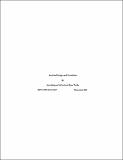Auction design and favoritism
Author(s)
Laffont, Jean-Jacques; Tirole, Jean
Download28596072.pdf (1.831Mb)
Metadata
Show full item recordAbstract
The theory of auctions has ignored the fact that often auction designers, not the principal, design auctions. In a multi attribute auction, the auction designer may bias his subjective evaluation of quality or distort the relative weights of the various attributes to favor a specific bidder, an ancient concern in the procurement of weapons, in the auctioning of government contracts and in the purchase of electricity by regulated power companies. The paper analyzes the steps to be taken to reduce the possibility of favoritism. It is first shown that in the absence of favoritism, quality differentials among firms are more likely to be ignored if the auction designer has imperfect information about the firm's costs. Second, if the auction designer may collude with only one bidder, the other bidders should be chosen if they are as least as efficient as the former bidder, and no hard information about quality differentials is released by the auction designer that would justify fair discrimination in favor of the former bidder. Last, if the auction designer can collude with any bidder, the optimal auction tends to a symmetric auction in which quality differentials are ignored. The possibility of favoritism reduces the auction designer's discretion and makes the selection process focus on non-manipulable (monetary) dimensions of bids.
Date issued
1989Publisher
MIT Center for Energy and Environmental Policy Research
Other identifiers
90-012
Series/Report no.
Working paper (Massachusetts Institute of Technology. Center for Energy Policy Research) ; MIT-CEPR 90-012.